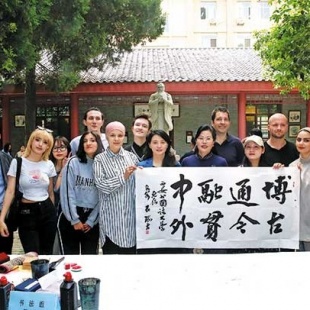Characters for the world
Growing interest in Chinese sees the language cross borders and enhance a sense of common purpose, Fang Aiqing reports.


She translates this "poem of witness" as: "A small, lonely peach blooms in pale rose, fog blurs the grass and the evening's crows. Ruined walls surround the old well, in house after house live only shadows."
Having recognized the different preferences for the use of metaphor in Chinese and English poetry, Bitter has also discovered the visual and musical aspects of Chinese poetry.
From her perspective, Chinese poetry, especially ancient verses, look well-organized, often having a rectangular shape, condensed in meaning and economic in the selection of words, whereas poems in English look like "caterpillars crawling along the page". Despite that, she still loves English-language poetry.
Additionally, the rhymes and tones often make Chinese poems sound amazing, she says.
Bitter's first encounter with a Chinese poem was in high school. It was Tang Dynasty (618-907) poet Li Bai's Chang Gan Xing, translated by US poet and critic Ezra Pound with the title The River-Merchant's Wife: A Letter.
She was impressed then by the beautiful translation that mostly deals with childhood sweethearts, a shy bride and the mounting intimacy of the newlyweds.
However, it was not until she learned Chinese and was able to read the original text many years later, that she was better able to understand the wife's resolution of pent-up love, which is conveyed at the end of the poem, as the result of her hopeless wait for her long-since departed husband.
"Looking at the translation and the original side by side reminds me of how glad I am that I can read the original text myself and develop my own understanding of it."
Since Bitter received her master's degree in creative writing at the University of Washington several years ago, she has continued to learn Chinese out of interest, using poetry as her study material instead of practical textbooks.
She writes poems herself. Looking back, she discovered that the repetition of lines in one of them, Luohua Shijie (Season of Fallen Petals) — imagery typical of ancient Chinese poems — was subconsciously influenced by Song Dynasty (960-1279) female poet Li Qingzhao, one of her favorite classical Chinese poets.
Li Qingzhao's poetry tracks the ups and downs of her life. Bitter particularly reads childhood fun and a teenage girl's secret thoughts in her words.
She really likes that her passion for rowing and regattas is echoed by Tang and Song poets, who were also passionate for this practice.
She adds that her rowing teammates love her amateur translations of these poems from ancient China, such as one that describes rowing as "embroidering the water", and Li Qingzhao's line: "A stroke, a stroke, a shoal of plovers rise in surprise."
"There's probably a lot of influence from Chinese poetry and the Chinese language in my work, and I'm certain my work is more interesting because of it," she says.





































